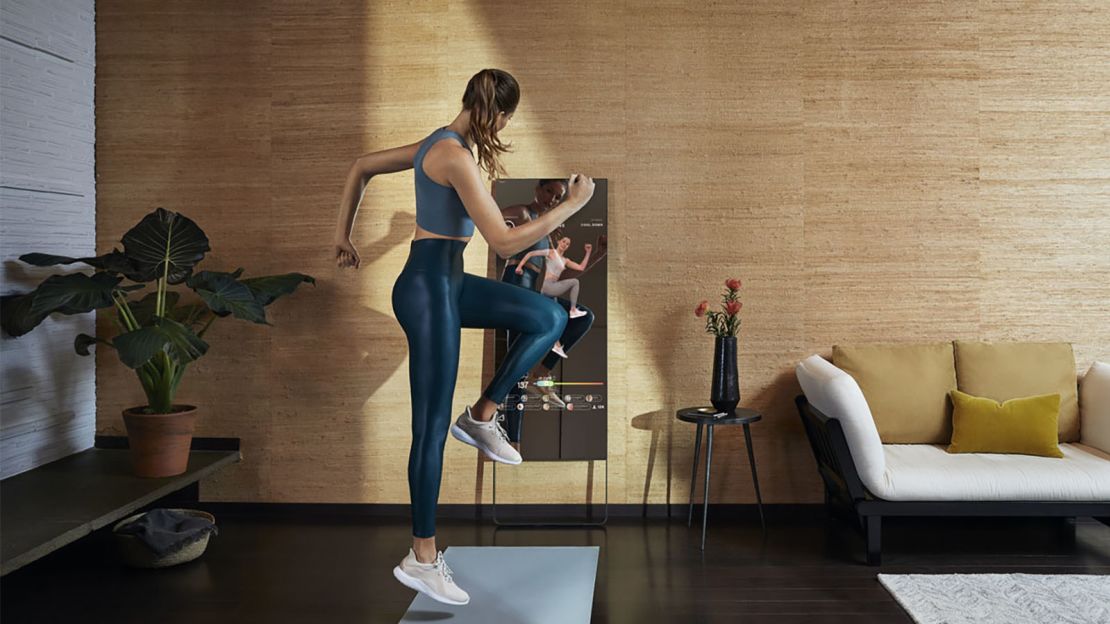Inside its New York City office, Mirror executive Kailee Combs is doing bicep curls while standing on a yoga mat. She’s looking directly into the immersive mirror that the startup sells.
It looks nearly identical to the full-length mirror you might have at home but a lot smarter. Instead of simply her reflection peering back, a personal trainer is visible and offers suggestions on how to correct her form.
“I can see you leaning back a bit – can you turn profile for me?” the trainer asks Combs, Mirror’s vice president of fitness. “I want [your heartbeats-per-minute] 10 points higher.”
Mirror, which launched in September 2018, is one of several companies changing the fitness landscape by making it easy for anyone to engage in live or on-demand interactive workout classes from the comfort of their home — with a substantial price tag. While taking classes ranging from cardio and yoga to boxing, customers can see key metrics like their heartbeats-per-minute (or BPM) and calories burned.
On Tuesday, Mirror announced it’s adding live personal training. By using Mirror’s built-in camera – which can be covered by a lens cap for privacy when not in use – customers can participate in one-on-one sessions. The device, which is controlled by an app on your phone, comes with fitness bands, a stand and a Bluetooth heart-rate monitor.
Mirror costs nearly $1,500 before tax and installation fees. That’s compared to other innovative at-home fitness offerings such as Peloton, which sells connected bikes and treadmills, and Tonal, which focuses on at-home strength training, that run between $2,245 and $4,295. Tonal mounts to the wall like a flat screen television and uses “digital weights” where the resistance is personalized.
Those costs don’t include ongoing subscription fees. Mirror costs $39 per month for up to six people in a household for access to its on-demand or live classes – the same price as Peloton’s subscription but $10 less per month than Tonal. Mirror is perhaps the most aesthetically pleasing of the offerings: The device could pass as simple home decor.
Mirror’s new personal training feature runs an additional $40 per private session, which can be booked a couple weeks ahead of time up until 90 minutes before a session.

For now, 10 trainers who work for the startup conduct the virtual sessions through studio space in Manhattan. The plan is to expand nationally and give trainers around the country the ability to work from their homes and reach customers through Mirror.
The new offering comes less than two weeks after Peloton made its Wall Street debut. Its IPO price valued Peloton at about $8 billion, or roughly double its private market valuation one year ago, but the company continues to trade below its IPO price.
Mirror founder and CEO Brynn Putnam, who spoke to CNN Business shortly before Peloton went public, said the company is taking a “different approach than the competition.” Putnam explained that she’s building a product that can flex as trends change. Mirror wants to be “the third screen in your life,” she said. In other words, it’s more about the ability to connect with consumers in their homes with ease than it is about the particular application.
Putnam, a former dancer for the New York City Ballet, in 2010 opened a boutique fitness studio, called Refine Method, inside of a church in Manhattan with a focus on full-body, high-intensity interval training. It was space Putnam could afford but she had to install custom-built equipment that could be removed weekly for Sunday morning services and rebuilt again shortly after.
Putnam came up with the idea after she struggled to fit workout classes into her schedule as a pregnant entrepreneur. Simultaneously, she noticed how much customers at Refine Method loved working out alongside mirrors. She sought to blend the two concepts.
The company has raised $38 million to date, from venture capital firms Spark Capital, Lerer Hippeau Vetures, First Round Capital, Primary Venture Partners, BoxGroup and Brainchild Holdings.
It took about two years to get the product ready but there’s been a lot of interest since launching, according to Putnam, who still has three Refine Method locations, as well. She said Mirror has sold tens of thousands of units to date. There are Mirrors in a variety of places outside the home, Putnam said, including nursing homes and high-end hotels. The company charges a separate subscription fee for corporate customers.
Similar to Peloton, Mirror has broad ambitions. In its IPO paperwork, Peloton described itself as “an innovation company at the nexus of fitness, technology, and media.” But Mirror is arguably more ambitious. In 2020, the startup expects to launch a meditation offering and expand into other aspects of life, including health, fashion and beauty.
“Fitness is just one of the many content experiences in the home,” said Putnam.























